

Multiple intelligences learning styles. Teaching Excellence in Adult Literacy (TEAL) Metacognition is one’s ability to use prior knowledge to plan a strategy for approaching a learning task, take necessary steps to problem solve, reflect on and evaluate results, and modify one’s approach as needed. It helps learners choose the right cognitive tool for the task and plays a critical role in successful learning. What Is Metacognition? Metacognition refers to awareness of one’s own knowledge—what one does and doesn’t know—and one’s ability to understand, control, and manipulate one’s cognitive processes (Meichenbaum, 1985). It includes knowing when and where to use particular strategies for learning and problem solving as well as how and why to use specific strategies.
Metacognition is the ability to use prior knowledge to plan a strategy for approaching a learning task, take necessary steps to problem solve, reflect on and evaluate results, and modify one’s approach as needed. Elements of Metacognition Why Teach Metacognitive Skills? What’s the Research? References Flavell, J. Kako-Wagner2001.pdf. Doc 4 Practical advice on academic discourse. 3: Morphological Knowledge - The Mental Lexicon. Orthographic Processing - Applied Learning Processes. ORTHOGRAPHIC PROCESSINGA critical factor in reading and writing fluency A spelling bee champion can often be seen writing on his hand with a finger as he tries to work out the spelling of a particularly challenging word.
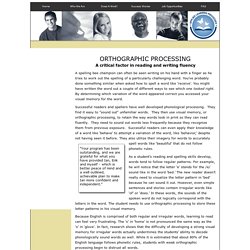
You’ve probably done something similar when asked how to spell a word like ‘receive’. You might have written the word out a couple of different ways to see which one looked right. By determining which variation of the word appeared correct you accessed your visual memory for the word. Successful readers and spellers have well developed phonological processing. Words to accurately spell words like ‘beautiful’ that do not follow phonetic rules. As a student’s reading and spelling skills develop, words tend to follow regular patterns. Because English is comprised of both regular and irregular words, learning to read can feel very frustrating. Effects of underdeveloped orthographic processing nological processing for letter sounds. Development of orthographic processing. Science Vocabulary. The comprehensive grade-by-grade science vocabulary lists below are based on state and national science standards.
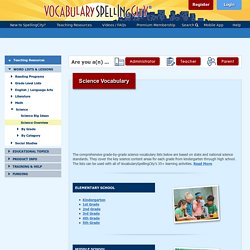
They cover the key science content areas for each grade from kindergarten through high school. The lists can be used with all of VocabularySpellingCity’s 35+ learning activities. Read MoreRead Less For each grade and science content area, there are both detailed lists and summary lists. For example, in the kindergarten science section, motion is one of the key areas. Sentences and definitions for the words on the Science Vocabulary lists have been customized to reflect their usages within the context of science.
The writing and editing of these lists, sentences, and definitions was performed under contract by science teachers and curriculum specialists from around the country to whom we are very grateful. The lists can be imported into teacher or parent accounts. Reinforcement of key concepts and/or assessment – For example, Mrs. Eighth Grade Science Vocabulary. The study of middle school science concepts is intriguing and challenging, yet the subject matter is vast.
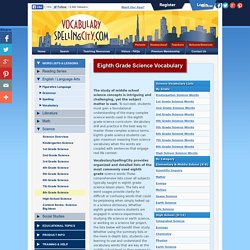
To succeed, students must gain a foundational understanding of the many complex science words used in the eighth grade science curriculum. Vocabulary drill and practice is the best way to master these complex science terms. Eighth grade science students can gain maximum meaning from science vocabulary when the words are coupled with sentences that engage real life context. VocabularySpellingCity provides organized and detailed lists of the most commonly used eighth grade science words.These comprehensive lists cover all subjects typically taught in eighth grade science lesson plans. The lists and word usages provide clarity for difficult or confusing words that could be perplexing when simply looked up in a science dictionary.
Students can play science games, hear the correct pronunciation of science terms, use eighth grade science worksheets, or test their knowledge online. Seventh Grade Science Vocabulary. Seventh grade science is where students really need to put on their thinking caps and understand the subjects on a deeper level.
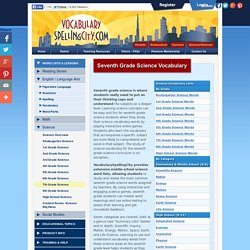
Learning science concepts can be easy and fun for seventh grade science students when they study their science vocabulary words by playing interactive online games. Students who learn the vocabulary that accompanies a specific subject are more likely to comprehend and excel in that subject. Sixth Grade Science Vocabulary. Sixth grade science can be a challenging subject, since most study of middle school science at this level requires much concentration and effort.
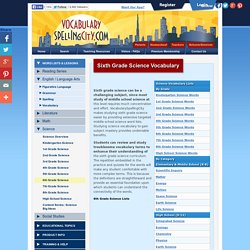
VocabularySpellingCity makes studying sixth grade science easier by providing extensive targeted middle school science word lists. Studying science vocabulary to gain subject mastery provides undeniable benefits. Students can review and study troublesome vocabulary terms to enhance their understanding of the sixth grade science curriculum. The repetition embedded in the practice and quizzes for the words will make any student comfortable with more complex terms. This is because the definitions are straightforward and provide an essential foundation upon which students can understand the connectivity of the words.
There are many ways to use these comprehensive sixth grade science word lists, whether through the summaries or full-length lists.